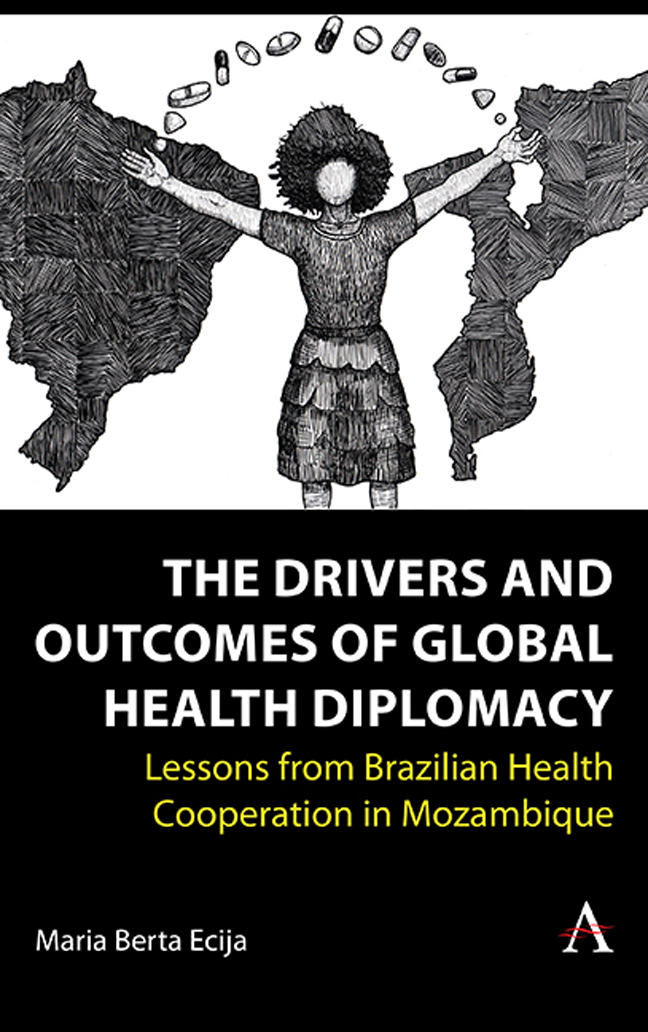 The Drivers and Outcomes of Global Health Diplomacy
The Drivers and Outcomes of Global Health Diplomacy Book contents
- Frontmatter
- Contents
- List of Abbreviations
- 1 Introduction and Methodology
- 2 Literature Review on Global Health Diplomacy – Brazil and Mozambique
- 3 Brazil and Global Health Diplomacy
- 4 Mozambique’s Foreign and Health Policy
- 5 Case Study of Sociedade Moçambicana de Medicamentos
- 6 Analysis and Outcomes
- 7 Conclusion
- Post-script: COVID-19 Disclaimer
- Bibliography
- Index
1 - Introduction and Methodology
Published online by Cambridge University Press: 29 February 2024
- Frontmatter
- Contents
- List of Abbreviations
- 1 Introduction and Methodology
- 2 Literature Review on Global Health Diplomacy – Brazil and Mozambique
- 3 Brazil and Global Health Diplomacy
- 4 Mozambique’s Foreign and Health Policy
- 5 Case Study of Sociedade Moçambicana de Medicamentos
- 6 Analysis and Outcomes
- 7 Conclusion
- Post-script: COVID-19 Disclaimer
- Bibliography
- Index
Summary
Introduction
Diplomacy is the art of managing international relations (IR) through the negotiation of alliances, treaties and agreements. It is concerned with dialogue in areas of mutual interest, aiming to reduce conflict, whilst proposing a peaceful tool for negotiation (Lee & Smith, 2011, p. 11).
Health has been a subject matter of diplomacy for a long time. However, as Kickbusch and Ivanova (2013, p. 13) note, the relationship between health and diplomacy has become more pronounced since the nineteenth century, as this was the moment when nation-states enhanced the development of transportation. Consequently, this development facilitated the greater exchange of merchandise and people throughout the globe. However, the greater circulation of individuals and goods increased the risk of transmission of diseases.
While developments in transportation were underway, significant advances in science and technology were also being achieved. These alleviated the tensions surrounding the outbreak of pandemics, and even foregrounded the idea of invincibility in society with regard to public health threats. Such advances thus created the idea that humankind was up to date with the latest possibilities of detecting, preventing and combatting diseases, due to the expertise acquired by experts in the field (Fidler, 2005, p. 185).
This restored optimism was soon obliterated by the occurrence of an epidemic – the outbreak of cholera in Europe from 1821 to 1851 – which crushed international trade and the new prospects brought by science. Measures were implemented to control this outbreak, such as quarantine, which were met with disapproval. According to traders, these measures represented immeasurable financial loss without compensation. A conservational idea was even put forward that some states should apply quarantine measures to boost unfair trade (Kickbusch & Ivanova, 2013, p. 13).
This example shows that for a long time, politics that were tailored towards preventing and combatting health threats tended to raise concerns and ended up being polemic. This reinforces the complexity of health and well-being as societal concepts, as well as the powerful influence that health has in other political, social and economic arenas. The COVID-19 outbreak and its consequences in 2020 show that not much has changed in how states and international organisations manage health crises.
Much of the mistrustfulness and debates that were part of the cholera outbreak in the nineteenth century, such as the economy versus human lives, lockdown and quarantine and information limitations, were repeated during the COVID-19 health crisis.
- Type
- Chapter
- Information
- The Drivers and Outcomes of Global Health DiplomacyLessons from Brazilian Health Cooperation in Mozambique, pp. 1 - 30Publisher: Anthem PressPrint publication year: 2023


